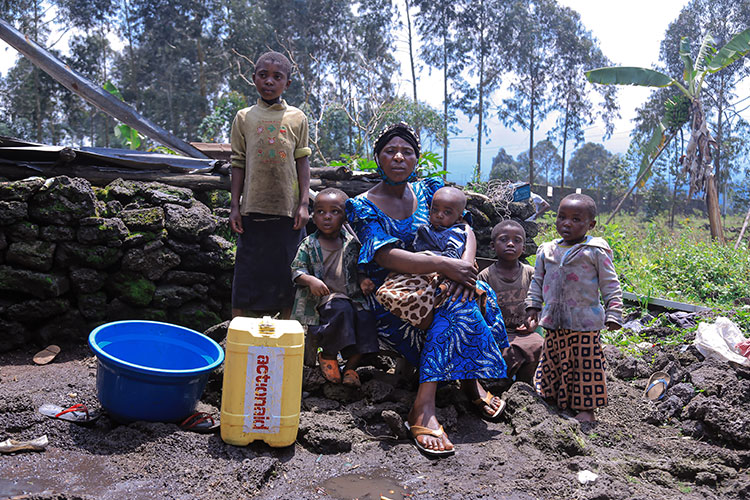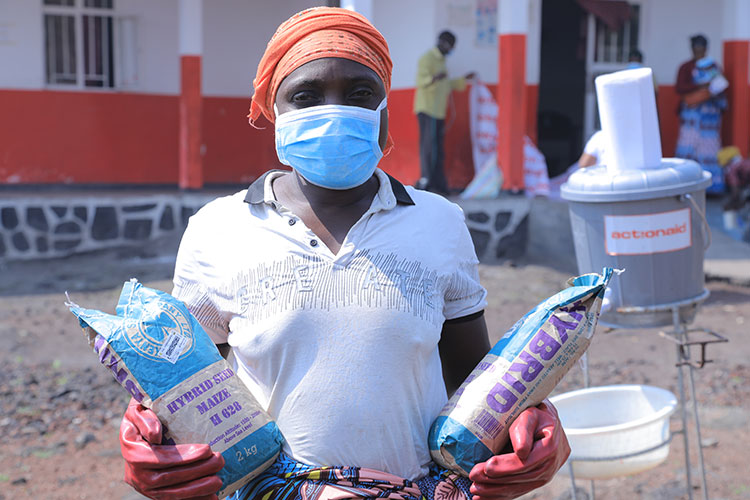The women leaders we have trained are confident and ready to deal with the new outbreak
A network of local women’s groups, trained by ActionAid as emergency responders during the last Ebola outbreak, are working to prevent the spread of the deadly disease as it returns to the Democratic Republic of Congo (DRC).
Yakubu Mohammed Saani, country director of ActionAid DRC, says one of the biggest challenges in preventing the spread of both Ebola and Covid-19 is tackling the misinformation about the diseases and vaccines.
“Fake news and misinformation about Ebola, Covid-19 and the vaccines that can curb these deadly diseases, is rife and there is a lot of mistrust within communities,” Saani says.
“ActionAid is working with local partners and women’s groups in North Kivu to share life-saving public health advice within their communities. We know from our response to the last Ebola outbreak and Covid-19 that this is the best way to build trust and reach the most vulnerable. Our response to the pandemic and previous outbreaks mean we are prepared to fight this latest emergence of Ebola. However, people in DRC are facing multiple health crises and rising violence and insecurity. Disease will spread quickly in crowded displacement camps and women and girls are at greater risk of sexual and gender-based violence.”
Widespread misbeliefs about Ebola include that it’s a curse or a demonic possession that can be cured by pastors, and many people think that Covid-19 doesn’t exist or that it cannot spread in Africa because of the climate. Common misperceptions about the vaccines against both diseases include that they can make women infertile and men impotent, and that they are designed to kill people, rather than protect them.
As many people do not have access to TVs in remote areas, ActionAid uses local radio stations to share public health advice about Ebola, reaching 500,000 people in Nyiragongo in North Kivu.
We have provided training to women in Nyiragongo on preventing the spread of Ebola and Covid-19, and are distributing hygiene kits, including hand sanitiser and facemasks, to families across five areas. Local partners have installed handwashing stations and provided access to clean water.
Women leaders have also received training about identifying and reporting cases of violence against women and girls. ActionAid has supported communities in Nyiragongo to build a women’s leadership centre which acts as a safe space for women to share the problems they face, including gender-based violence.
Speaking from North Kivu province where new cases of Ebola were discovered earlier this month, ActionAid DRC project officer Cecile Kasoki says:
“People in North Kivu are feeling scared about this Ebola outbreak, especially as it comes during Covid-19 and the economic crisis the pandemic has caused. They are worried there won’t be the resources to fight this latest threat and that the international community will not assist poor countries like DRC as they are battling the pandemic in their own countries.”
She adds: “The women leaders we’ve trained are confident and ready to deal with the new outbreak. They are breaking down the traditional barriers limiting what women are told they can do. Their communities trust them, but there is still a lot of work to be done in terms of supporting people to protect themselves from Ebola and Covid-19.”
This article was originally published by ActionAid International, “Women’s groups lead the fight against misinformation as Ebola returns to DRC”, 24/02/2021.
Photo credit: Natasha Mulder


